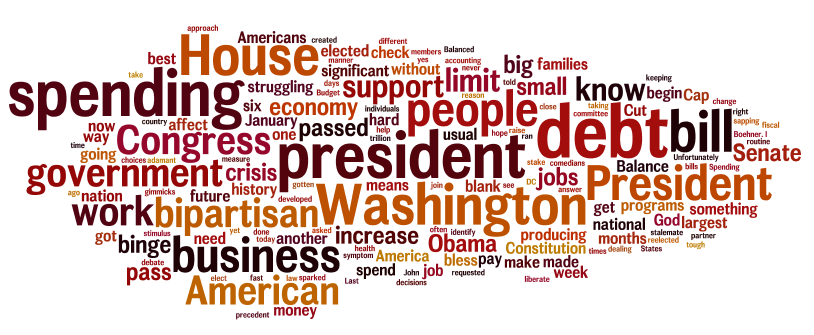No Need To Respond
Posted on September 7, 2011
 Ev and Gerry started the whole response thing.
Ev and Gerry started the whole response thing.Everett Dirksen and Gerry Ford, the former Senate Republican leader from Illinois and the former House Minority Leader (and later President) from Michigan used to have a radio show broadcast from the Capitol.
They turned that radio show into a televised rebuttal to President Johnson’s 1966 State of the Union Address.
Dirksen, with his mop of white hair, and Ford, with his bald pate, must have been quite a sight in the years leading up to the Age of Aquarius. Dirksen was the one who famously said, “a billion here, and a billion there, and pretty soon you are talking real money.”
I could understand the frustration of the two Republican (and minority) leaders. Lyndon Johnson wasn’t much to tell the truth, and Republicans at the start of 1966 didn’t have any legislative power. Dirksen, a genius when it came to the political communication innovation, probably dreamed up the idea of a joint response, and a new idea was born: Let’s tell our side of the story.
The Ev and Gerry Show only played two seasons as responses to LBJ, but a tradition was born. In 1968, more Republicans wanted to get in the act, and the Republicans ran a response that included 16 different Representatives and Senators. I bet you hearing from more than a dozen politicians in January of 1968, just as the summer of love and the season of destruction and discontent (including the assassinations of Robert Kennedy and Martin Luther King), was just what the voting public wanted to hear.
Democrats continued that tradition in responding to Richard Nixon, another President known for truth telling. Mike Mansfield, the long-time Senate Democratic leader, usually anchored the responses to Nixon.
During Ronald Reagan’s first term, the Democrats were so confused about how to respond to the Great Communicator and so riven by internal conflicts that their response included an average of 12 Democrats from every segment of the party. It wasn’t hard for Reagan to beat out that cacophony of voices. By the time Reagan’s second term rolled around, the Democrats gave in and let their respective leaders, Jim Wright and Robert Byrd, do the majority of their rebuttals.
I worked for Bob Michel when he gave his response to Bill Clinton’s first Presidential address. There was disagreement within the Michel office about whether Bob should give the response or give it to somebody else to do. I argued that if Bob wanted to be the Leader (he had Newt Gingrich nipping at his heels at the time), then he should take the response and knock it out of the park. He did exactly that, giving a great speech, but an organized and nasty response to his response by organized (and nasty) labor unions hit Bob hard and he ultimately decided to retire a year later.
In the chaos that followed the resignation of Newt Gingrich in 1998, there was confusion as to who would give the response to an impeached (but not convicted) Bill Clinton. Bob Livingston (who was the interim Speaker until he resigned over a sex-scandal) had picked Jennifer Dunn and Steve Largent to give the response as a way to tweak Dick Armey, who had been a pain in his side. Dunn and Largent had unsuccessfully run against Armey as leader. Denny Hastert (who I also worked for), who ultimately did become Speaker, decided to stick with Dunn and Largent (smartly choosing to avoid the public spotlight), and they gave a run-of-the-mill rebuttal.
Republicans have had three chances to respond to Barack Obama. Bobby Jindal knocked himself out of Presidential contention with his response to Obama’s first Presidential address in 2009. Bob McDonnell (who should run for President, by the way) gave a workmanlike response in 2010. Paul Ryan’s response was overshadowed by Michele Bachmann’s intrusion into the response game. Bachmann spent most of her time in the spotlight looking like she was looking into the wrong camera, which may have hurt her with her colleagues, but obviously didn’t hurt with the Ames Straw poll voters.
John Boehner and Mitch McConnell have made the decision to not respond to President Obama’s latest effort to talk to the American people through the Congress. They say that they want the President’s speech to stand on its own merits.
Looking at the long history of the rebuttal game, they are right to make that call. Nothing good happens in a rebuttal.
Nothing Republicans say will make the President’s address more or less believable. No amount of spin can hide the fact that the President and Congressional Republicans are not on the same page on what do about our nation’s economic troubles. Words from the President’s aren’t going to fix these troubles, and counter-words from the other side aren’t going to make anybody feel any better.
And no amount of talking from the President or the Republicans is going to hide the fact that the NFL is going to still be kicking off at 8:30 eastern time.
The President can talk all he wants just as long as he gets done by the kickoff.
It would nice if we could just stop the responses in their entirety. To Congress, I say this: Give the President a chance to propose, and then dispose of his proposals as you see fit.
There’s no need to respond to this President at this time. Enough has been said already.
